In his book "21 lessons for the twenty-first century", the Israeli historian Yuval Noah Harari proposes keys to understand our time. We have selected three.
It takes men to build the world. We need others to make it intelligible. Yuval Noah Harari is one of them. At 42, this Israeli historian has just published 21 lessons for the twenty-first century (1). We do not have to join him on everything. It's hard to feel stupid after reading it before.
Throughout his "lessons", he offers us keys to understand the moment we are going through collectively. Let's remember three.
First key: we live in "a time of perplexity". The twentieth century had three great "stories" supposed to illuminate the past and predict the future, to fix who was good, who was mean. The fascist narrative was eliminated in 1945. The communist narrative collapsed with the fall of the Berlin Wall. The liberal narrative remained alone on track from 1989 to 2008. The recipe for better living together seemed clear, combining human rights, the right to vote, free movement of people, ideas and goods. Alas, the global financial crisis put an end to this enthusiasm. Place to disenchantment.
Second key: this disenchantment is not unfounded, but the historian considers it as excessive as the trust that preceded it. Despite its shortcomings, the "liberal narrative" retains a better record than any other. "Most men have never known more peace and prosperity than under the aegis of the liberal order in the early twenty-first century. For the first time in history, infectious diseases kill less than old age, famine less than obesity and violence less than accidents. "
Pirated imagination
The third key lies in the secret link between the great revolutions of our time and the inner life of individuals. "Terrorism is a global political problem as well as an internal psychological mechanism. It operates by pushing the "fear" button into our minds and hacking the imagination of millions of individuals. [...] The success or failure of terrorism therefore depends on us. Let's free our imagination from the terrorists, react in a balanced and cold way, and it will fail. "
Same thing for the rising nationalist wave. For Yuval Noah Harari, it can not bring us back in 1939 or 1914. Simply because it is unsuited to the crucial issues of the moment. "Technology has changed everything by creating a set of threats that no nation can solve alone": nuclear war, climate change and the breathtaking prospects opened up by the ongoing marriage of biotechnology and information technology.
"If, despite these common threats, men choose to pass their national loyalties before anything else, the result could be much worse than in 1914 or 1939." Hence the interest of Harari in the European experience , so singular on the scale of the planet, in spite of its insufficiencies and its slowness.
In the end, at this time of great uncertainty, it would be best if the threat consciousness did not lead us to ostrich politics or panic. Except to commit the well-known mistake of anyone accompanying the first bicycle rides of a loved one. By dint of repeating to him, the trembling voice, "be careful, take care," he causes his fall. Stress is spreading. Trust too.
(1) 21 lessons for the twenty-first century, by Yuval Noah Harari. Albin Michel, October 2018.

